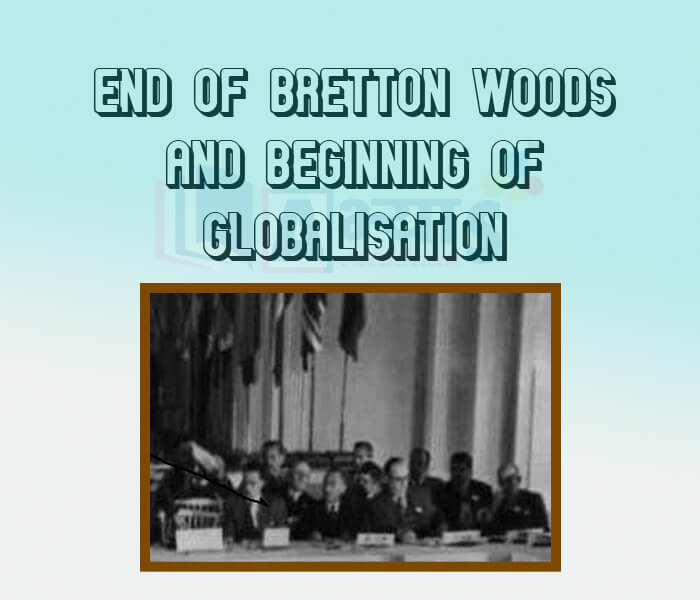End of Bretton Woods and Beginning of Globalisation










End of Bretton Woods and Beginning of Globalisation
End of Bretton Woods and the Beginning of 'Globalisation': From the 1960s, the rising cost of US's overseas involvements weakened its finances and competitive strength. The US dollar could not maintain its value in relation to gold. This eventually led to the collapse of the system of fixed exchange rates and the introduction of a system of floating exchange rates.
Change in International Financial System: From the mid-1970s, the international financial system changed. The developing countries were then forced to borrow from Western commercial banks and private lending institutions This led to periodic debt crises, lower incomes and increased poverty in Africa and Latin America.The industrial world was also hit by unemployment between the mid-1970s to the early 1990s. From the late 1970s, MNCS also began to shift production operations to low wage Asian countries.
New Economic Policy in China: China had been cut off from the post war world economy since its revolution in 1949. But new economic policies in China and the collapse of the Soviet Union and Soviet style communism in Eastern Europe brought many countries back into the fold of the world economy. Wages were relatively low in countries like China.
Thus, China became a favourite destination for investment by foreign MNCS competing to capture world markets. In the last two decades, the world's economic geography has changed a lot as countries like China, India and Brazil have achieved rapid economic development.
#Exchange Rates :- they link national currencies for purposes of international trade . there are broadly two kinds of exchange rates :- Fixed exchange rates and floating exchange rates .
Students / Parents Reviews [10]
My experience with Abhyas academy is very good. I did not think that my every subject coming here will be so strong. The main thing is that the online tests had made me learn here more things.

Hiya Gupta
8thI have spent a wonderful time in Abhyas academy. It has made my reasoning more apt, English more stronger and Maths an interesting subject for me. It has given me a habbit of self studying

Yatharthi Sharma
10thIt was good as the experience because as we had come here we had been improved in a such envirnment created here.Extra is taught which is beneficial for future.

Eshan Arora
8thIt was a good experience with Abhyas Academy. I even faced problems in starting but slowly and steadily overcomed. Especially reasoning classes helped me a lot.

Cheshta
10thA marvelous experience with Abhyas. I am glad to share that my ward has achieved more than enough at the Ambala ABHYAS centre. Years have passed on and more and more he has gained. May the centre flourish and develop day by day by the grace of God.

Archit Segal
7thMy experience was very good with Abhyas academy. I am studying here from 6th class and I am satisfied by its results in my life. I improved a lot here ahead of school syllabus.

Ayan Ghosh
8thAbhyas Methodology is very good. It is based on according to student and each child manages accordingly to its properly. Methodology has improved the abilities of students to shine them in future.

Manish Kumar
10thOne of the best institutes to develope a child interest in studies.Provides SST and English knowledge also unlike other institutes. Teachers are co operative and friendly online tests andPPT develope practical knowledge also.

Aman Kumar Shrivastava
10thAbhyas is a complete education Institute. Here extreme care is taken by teacher with the help of regular exam. Extra classes also conducted by the institute, if the student is weak.

Om Umang
10thBeing a parent, I saw my daughter improvement in her studies by seeing a good result in all day to day compititive exam TMO, NSO, IEO etc and as well as studies. I have got a fruitful result from my daughter.
